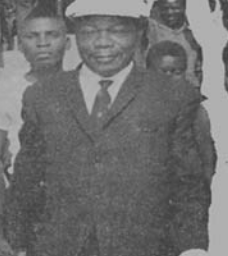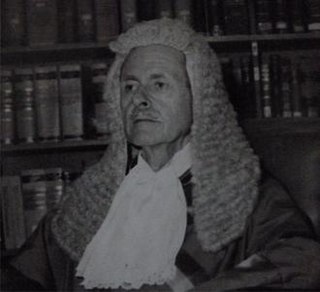Related Research Articles

Kenneth Kaunda, also known as KK, was a Zambian politician who served as the first president of Zambia from 1964 to 1991. He was at the forefront of the struggle for independence from British rule. Dissatisfied with Harry Nkumbula's leadership of the Northern Rhodesian African National Congress, he broke away and founded the Zambian African National Congress, later becoming the head of the socialist United National Independence Party (UNIP).
The history of Zambia experienced many stages from colonisation to independence from Britain on 24 October 1964. Northern Rhodesia became a British sphere of influence in the present-day region of Zambia in 1888, and was officially proclaimed a British protectorate in 1924. After many years of suggested mergers, Southern Rhodesia, Northern Rhodesia, and Nyasaland were merged into the British Federation of Rhodesia and Nyasaland.

The politics of Zambia takes place in a framework of a presidential representative democratic republic, whereby the president of Zambia is head of state, head of government and leader of a multi-party system. Executive power is exercised by the government, while legislative power is vested in both the government and parliament. Formerly Northern Rhodesia, Zambia became a republic immediately upon attaining independence in October 1964.

After independence in 1964 the foreign relations of Zambia were mostly focused on supporting liberation movements in other countries in Southern Africa, such as the African National Congress and SWAPO. During the Cold War Zambia was a member of the Non-Aligned Movement.

The president of Zambia is the head of state and the head of government of Zambia. The office was first held by Kenneth Kaunda following independence in 1964. Since 1991, when Kaunda left the presidency, the office has been held by seven others: Frederick Chiluba, Levy Mwanawasa, Rupiah Banda, Michael Sata, Edgar Lungu and the current president Hakainde Hichilema, who won the 2021 presidential election. In addition, acting president Guy Scott served in an interim capacity after the death of President Michael Sata.

The University of Zambia (UNZA) is a public university located in Lusaka, Zambia. It is Zambia's largest and oldest learning institution. The university was established in 1965 and officially opened to the public on 12 July 1966. The language of instruction is English.
Luke Mwananshiku was a Zambian banker, businessman, politician and diplomat. He was a government minister under Zambia's first president, Kenneth Kaunda, serving as the governor of the Bank of Zambia from 1976 to 1981, and as Minister of Foreign Affairs from 1986 to 1990. Mwananshiku was also Minister of Finance from 1982 to 1987. He served as a director of the Zambia Consolidated Copper Mines and of the International Monetary Fund. He died at the Trust Hospital in Lusaka of heart failure in 2003.

Barotseland is a region between Namibia, Angola, Botswana, Zimbabwe including half of north-western province, southern province, and parts of Lusaka, Central, and Copperbelt provinces of Zambia and the whole of Democratic Republic of Congo's Katanga Province. It is the homeland of the Lozi people or Barotse, or Malozi, who are a unified group of over 46 individual formerly diverse tribes related through kinship, whose original branch are the Luyi (Maluyi), and also assimilated Southern Sotho tribe of South Africa known as the Makololo.
The African Writers Series (AWS) is a collection of books written by African novelists, poets and politicians. Published by Heinemann, 359 books appeared in the series between 1962 and 2003.
Mainza Mathias Chona was a Zambian politician and founder of UNIP who served as the third vice-president of Zambia from 1970 to 1973 and Prime Minister on two occasions: from 25 August 1973 to 27 May 1975 and from 20 July 1977 to 15 June 1978.
Alice Lenshina (1920–1978) was a Zambian woman, prisoner of conscience and self-appointed "prophetess" who is noted for her part in the "Lumpa Uprising", which claimed 700 lives.

Harry Mwaanga Nkumbula was a Zambian nationalist leader involved in the movement for the independence of Northern Rhodesia, as Zambia was known until the end of British rule in 1964. He was born in the village of Maala in the Namwala district of Zambia's southern province. He was the youngest of three children and the only son.
Simon Mwansa Kapwepwe was a prominent Zambian politician, anti-colonialist, and author, born on April 12, 1922. Kapwepwe made significant contributions towards Zambia's struggle for independence, working tirelessly towards achieving the country's liberation from colonial rule.
Christianity has been very much at the heart of religion in Zambia since the European colonial explorations into the interior of Africa in the mid 19th century. The area features heavily in the accounts of David Livingstone's journeys in Central Africa.

James John Skinner was an Irish-born Zambian politician and jurist. He was the first Minister of Justice of independent Zambia and the only White member of Zambia's first cabinet. Following his time as a Zambian jurist, Skinner moved to neighbouring Malawi, where he was Chief Justice of Malawi from 1970 to 1985. His final judicial appointment was as a Social Security Commissioner in England from 1986 to 1996.

The Federation of Rhodesia and Nyasaland, also known as the Central African Federation (CAF), was a colonial federation that consisted of three southern African territories: the self-governing British colony of Southern Rhodesia and the British protectorates of Northern Rhodesia and Nyasaland. It existed between 1953 and 1963.
Reuben Chitandika Kamanga was a Zambian freedom fighter, politician and statesman. He was educated at Munali Secondary School.

The Lusaka Manifesto is a document created by the Fifth Summit Conference of East and Central African States which took place between 14 and 16 April 1969 in Lusaka, the capital of Zambia. Produced at a time when the Republic of South Africa and its affiliated white-ruled regimes in Mozambique, Rhodesia, and Angola were relatively strong but politically isolated, the Manifesto called upon them to relinquish white supremacy and minority rule and singled out apartheid South Africa for violation of human rights. In the manifesto, which was subsequently adopted both by the Organisation of African Unity and the United Nations, thirteen Heads of State offered dialogue with the rulers of these Southern African states under the condition that they accept basic principles of human rights and human liberties. They also threatened to support the various liberation wars if negotiations failed.
Timeline of Zambia (Northern Rhodesia)

Turkey's embassy in Lusaka opened in 2011 and the Zambian embassy in Ankara opened in 2013.
References
- 1 2 3 4 S, D. (1963-04-01). "Zambia Shall be Free". African Affairs. 62 (247): 170–171. doi:10.1093/oxfordjournals.afraf.a095104. ISSN 0001-9909.
- ↑ Markhama, J. G. (September 1963). "Reviews: Zambia Shall be Free by Kaunda Kenneth London, Heinemann, 1962. Pp. 202. 12s. 6d". The Journal of Modern African Studies. 1 (3): 421–423. doi:10.1017/S0022278X00001993. JSTOR 158939. S2CID 153446760.